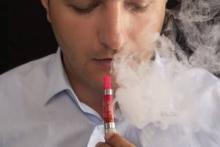Pediatricians have numerous and growing concerns about the known and unknown risks of electronic cigarettes, and the industry’s aggressive, "unfettered" marketing that often targets children is particularly worrisome, a representative of the American Academy of Pediatrics said at a Senate hearing June 18.
"Pediatricians think it’s only a matter of time before a young child dies from e-cigarettes," Dr. Susanne E. Tanski, chair of the AAP Tobacco Consortium, an advisory group dedicated to protecting children and youth from tobacco, told the Senate Committee on Commerce, Science, and Transportation.
Dr. Tanski, a pediatrician at Dartmouth-Hitchcock Medical Center in Lebanon, N.H., noted that e-cigarettes come in candy flavors, such as Cotton Candy and Atomic Fireball, which are tempting to children. She said e-cigarettes are not required to be sold in childproof containers and, contrary to claims, they do not contain benign ingredients.
E-cigarettes, battery-operated devices that vaporize nicotine, also may be a pathway to children’s use of regular cigarettes, Dr. Tanski said. Any potential reduction in harm in adults who use them as an alternative to regular cigarettes remains unproven, she added.
Moreover, e-cigarettes are causing the "renormalization" and "reglamorization" of smoking through ubiquitous TV ads and celebrity endorsements that appeal to children, Dr. Tanski and others testified.
Dr. Tanski cited troubling statistics: The use of e-cigarettes more than doubled in a single year (from 4.7% in 2011 to 10.0% in 2012), with 1.78 million U.S. students reporting e-cigarette use in 2012. She said a recent Internet-based study conducted in 2013-2014 found even higher rates of use: 14% of 13- to 17-year-olds had tried e-cigarettes, and 9% currently used them.
During the hearing, Jason Healy, president of blu eCigs, and Craig Weiss, president of NJoy, spent two-and-a-half hours defending industry marketing practices that include making heavy use of social media, running TV commercials, and sponsoring sporting events. Both insisted that their marketing is not aimed at young people, and their products are an important alternative for 40 million adult smokers in the United States.
Mr. Healy said blu eCigs, which is owned by tobacco company Lorillard Inc., has adopted voluntary marketing restrictions, and markets e-cigarettes only in places where at least 85% of the audience is adult. He said flavors "keep adults interested" in the product, and 51 is the average age of its user.
Mr. Weiss said e-cigarettes "give a positive alternative to people who cannot or will not quit." Later, he said in response to direct questioning by Sen. Jay Rockefeller (D-W.V.), the commerce panel’s chair: "I don’t think our ads appeal to young people."
Opening the hearing, Sen. Rockefeller warned that he is "emotionally on edge on this whole subject." He said marketing of e-cigarettes has been "soaring, including and especially to young people." He cited a 256% increase in youths’ exposure to TV commercials for e-cigarettes between 2011 and 2013, and a recent report finding that TV commercials and print ads for e-cigarettes are reaching millions of youths.
America’s youth "seem to be getting the message pretty clearly," even though the industry asserts that it is not targeting children with its e-cigarette marketing, Sen. Rockefeller said. He said 60 years ago he might have been interested in products with flavors like "Cherry Crush," "Peachy Keen," "Bazooka Joe," and "Gummy Bear," but now he is not. "That’s not adult stuff. That’s aimed at children," he said.
Citing the generations of Americans who became addicted to nicotine in regular cigarettes and other tobacco products, Sen. Rockefeller wondered whether e-cigarettes could do the same thing. "We figure about 4,000 kids in West Virginia are affected by this. Badly," he said. He said poison control centers are getting a rising number of calls on e-cigarettes, particularly involving children under the age of 5.
The senator accused the industry of widely marketing a product when its long-term health consequences remain unknown and questions about whether e-cigarettes contain toxins other than nicotine remain unanswered. "You want to make money, so you plunge in, get what you can" – until the Food and Drug Administration steps in to regulate, he said, adding that such regulation could take a long time.
(In April, the FDA proposed regulating e-cigarettes, adding warning labels and banning sales to anyone under 18, which already is being done in several states. No marketing restrictions were placed on e-cigarette makers and there is no ban on fruit or candy flavors, which cannot be used in regular cigarettes.)


